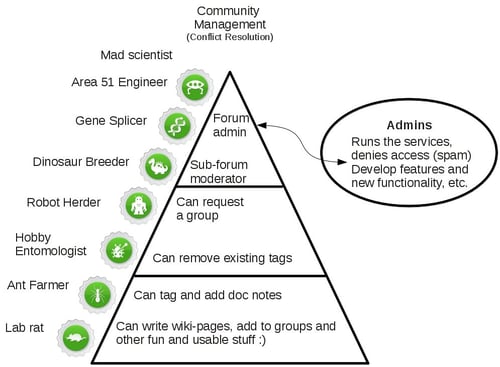Qt-project.org under Open Governance
April 18, 2013 by Knut Yrvin | Comments
Right before Qt Developer Days in Berlin, November 2012, we began discussing with the qt-project.org moderators how to bring rest of the Qt Project into Open Governance. This includes the content management system, forums, wikis and so on – everything run as a real community-driven project, as the Qt development itself has been run since October 2011.

This figure shows the different roles in the Open Governance structure. A detailed explanation is found on the Web Open Governance page[1].
To make a proper plan, we’ve been running a series of structured IRC meetings, open for all, starting in December last year, continuing through February this year. As the meeting summaries show[2], we started the planning sessions with a discussion on the purpose of the Qt Project Web. Then we continued with discussion and investigation on how maintenance can be done, including co-development of the web content management system. Technical issues, such as improvement with single sign-on and improvements to the wiki-system were discussed. Privacy, internationalization and license issues have also been looked at.
Here are some key topics and actions crystallizing out of these meetings:
- Single sign-on and a wiki which handles merges (not losing work) Enabling system rights for developing, testing and rolling out new features, including maintenance has to be established.
- From a roles perspective: several new roles with extended rights are needed, especially giving more access to different admin rights as group management and access to specific web pages.
- From a process perspective: lazy approval, task prioritization and a conflict resolution board, if needed, in case of (hopefully very few) unresolved conflicts.
- Also the licensing issue was raised, making the Qt Project Web user agreement clearer, also including licensing to maintain privacy when doing system administration, testing, and development tasks on the site.
Next steps
We are now working on four parallel activities to make Open Governance happen.
- For CMS development, we are on our way to implement a three-stage infrastructure with a development server and a staging server before production. Today, this is a two-stage setup. We want three stages, which allows the OS to be more flexible in doing the development.
- We are working at implementing a new access-rights model to allow access to different parts of the CMS.
- We have identified the need for a “system admin” agreement which is needed before granting extended group admin rights and giving access to fully developed new features, including editing web pages on the site. This agreement is designed to respect privacy laws and simplify the implementation of the planned staged development setup.
- It seems like the biggest obstacle in the current system is the wiki lacking support for merges when co-writing. Also the single sign on has been identified as one of the key features requested. Given our limited resources, it might be best if these features were to be actively co-developed with Digia together with the community.
There are a couple of other things currently being worked on, such as cleaning up the CSS, simplifying the site navigation, removing old links, and a walk through of the old bugs in the bug-tracker. This work is currently under way.
Since these processes are being run in parallel with the upkeep and maintenance of qt-project.org site from day to day, it’s a little difficult to give an exact time span on when each step will be implemented. We will give progress updates on the Qt Project malinglist[3].
Please have a look at the references below for more information. We welcome your feedback.
1. http://qt-project.org/wiki/Qt_Project_Web_Open_Governance
2. http://qt-project.org/wiki/Qt_Project_Web_Meeting_Summary
3. http://lists.qt-project.org/mailman/listinfo/web
Blog Topics:
Comments
Subscribe to our newsletter
Subscribe Newsletter
Try Qt 6.10 Now!
Download the latest release here: www.qt.io/download.
Qt 6.10 is now available, with new features and improvements for application developers and device creators.
We're Hiring
Check out all our open positions here and follow us on Instagram to see what it's like to be #QtPeople.


